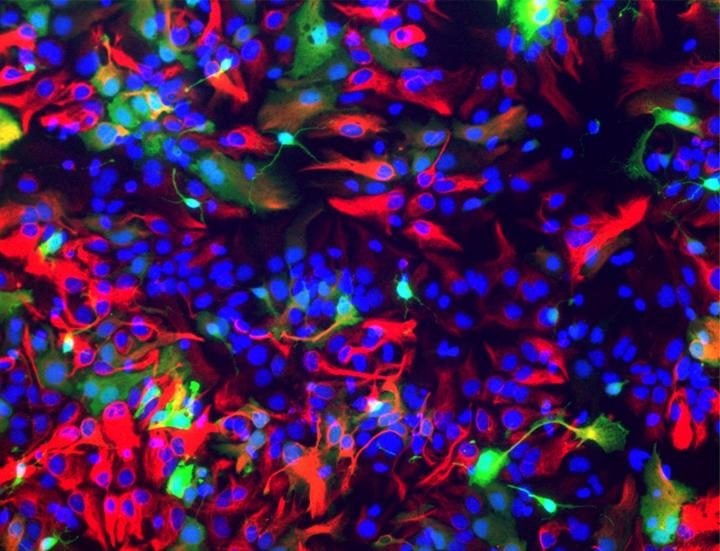Summary: SISSA researchers describe their findings about how the Foxg1 gene is involved in the development and differentiation of neurons and glial cells from stem cells.
Source: SISSA (The International School for Advanced Studies)
A new study by SISSA identifies the gene which regulates the production ratio of neurons and support cells during cerebral cortex development
Our brain comprises 85 billion nerve cells and just as many so-called glial cells, which work in close contact with the former to guarantee their proper function. All originate from brain stem cells. But what decides when and how many of them become neurons or glial cells? A new study led by the Laboratory of Cerebral Cortex Development of SISSA has shown how the Foxg1 gene, already involved in numerous processes of cerebral development and in rare disorders like Rett and West syndromes, plays a fundamental role in piloting the differentiation of stem cells, guaranteeing that neurons and glial cells are produced in the right quantity and at the right moment. The work, published in Cerebral Cortex and conducted in collaboration with the University of Cambridge and the IRCCS Burlo Garofolo, opens new roads to understanding and treating incurable genetic diseases.
Cortico-cerebral development is a very complex process and remains largely mysterious. Stem cells give life to neurons, then to glial cells, starting with the astrocytes, which are essential for nourishing nerve cells and modulating their activity. In human beings, this occurs after the fourth month of pregnancy, when the production of nerve cells tends to finish and that of astrocytes begin to increase. In rodents, this shift takes place immediately after birth.

Up to now, it had not been clear what coordinated this transition, but SISSA researchers have shown that the Foxg1 gene, already known for its involvement in other development processes and in some rare diseases, regulates stem cell differentiation behavior like a true “conductor”. They observed that the level of expression of this gene declines naturally, a short time before astrocyte production begins. Then the researchers modulated the expression of this gene, both in vitro and in vivo, and observed that an increase in this expression slows down the passage from production of neurons to astrocytes; on the other hand, a decrease in the expression facilitates it. They also confirmed that very similar phenomena occur in human stem cells. Finally, the scholars also investigated the mechanisms through which this phenomenon articulates itself and identified two types of processes. On one side, Foxg1 regulates the expression of four master genes implicated in the choice between production of neurons and that of astrocytes; on the other, it modulates the function of several molecular machines (gene batteries) involved in the execution of the astrocyte differentiation program.
“It is a very important result, both scientifically and methodologically speaking,” comments Antonello Mallamaci, director of the Laboratory of Cortical Development of SISSA and study leader. “The role of Foxg1 in this transition process and its involvement in disorders such as the variants of the Rett and West syndrome suggests that some of the anomalies typical of these syndromes are generated by an alteration of the time scale with which the astroglial cells are generated and opens the way to possible gene therapies.”
“Furthermore” adds Mallamaci, “the combination of in vitro and in vivo study and the comparison with the results obtained in human stem cells has proven to be a winning approach to study highly preserved development processes. This approach can certainly be used in the future to answer new questions.”
Source: SISSA (The International School for Advanced Studies)
Media Contact: Donato Ramani – SISSA
Publisher: Discovery of the Genetics Conductor of Brain Stem Cells organized by Neuroscience News.
Image Source: NeuroscienceNews.com image is credited to Cerebral Cortex Development Lab, SISSA..
Original Research: Abstract for “Foxg1 Antagonizes Neocortical Stem Cell Progression to Astrogenesis” by Carmen Falcone, Manuela Santo, Gabriele Liuzzi, Noemi Cannizzaro, Clara Grudina, Erica Valencic, Luca Peruzzotti-Jametti, Stefano Pluchino, Antonello Mallamaci in Cerebral Cortex. Published March 1, 2019
doi: 10.1093/cercor/bhz031
Funding: The research was financed by Telethon and also made possible by dedicated internal funding.
Abstract
Foxg1 Antagonizes Neocortical Stem Cell Progression to Astrogenesis
Neocortical astrogenesis follows neuronogenesis and precedes oligogenesis. Among key factors dictating its temporal articulation, there are progression rates of pallial stem cells (SCs) towards astroglial lineages as well as activation rates of astrocyte differentiation programs in response to extrinsic gliogenic cues. In this study, we showed that high Foxg1 SC expression antagonizes astrocyte generation, while stimulating SC self-renewal and committing SCs to neuronogenesis. We found that mechanisms underlying this activity are mainly cell autonomous and highly pleiotropic. They include a concerted downregulation of 4 key effectors channeling neural SCs to astroglial fates, as well as defective activation of core molecular machineries implementing astroglial differentiation programs. Next, we found that SC Foxg1 levels specifically decline during the neuronogenic-to-gliogenic transition, pointing to a pivotal Foxg1 role in temporal modulation of astrogenesis. Finally, we showed that Foxg1 inhibits astrogenesis from human neocortical precursors, suggesting that this is an evolutionarily ancient trait.






